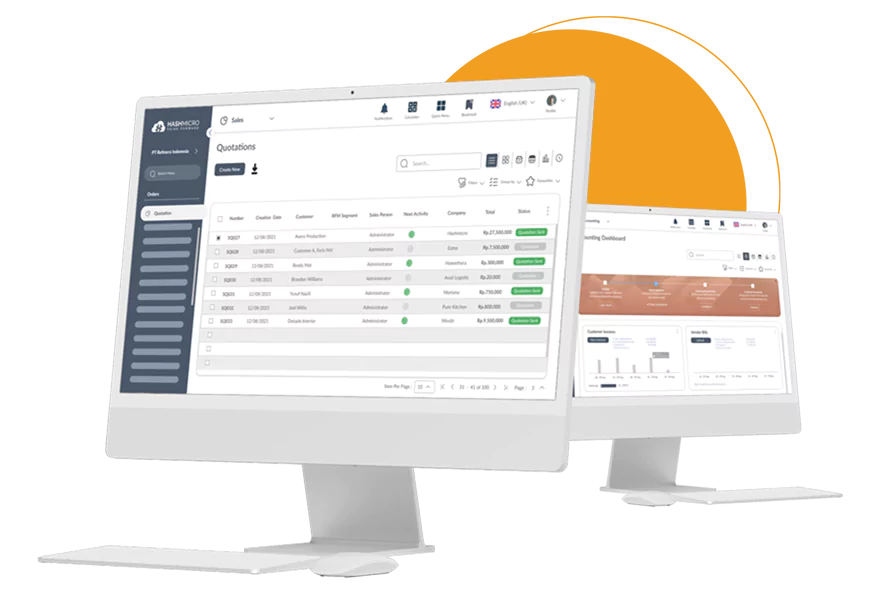In the fast-paced world of software development, companies strive to create innovative solutions and deliver exceptional products to their clients. As these companies grow, there may be numerous challenges in managing their complex operations, such as project planning, resource allocation, and client relationship management.
To overcome these challenges, a software development company requires a robust software solution that can streamline its diverse business processes.
This is where Enterprise Resource Planning (ERP) steps in as the ultimate solution. ERP serves as a centralized system that empowers software development companies to effectively manage their end-to-end operations.
By implementing ERP for software development companies, these companies can optimize their project planning and execution, ensuring efficient resource allocation and timely delivery.
Therefore, implementing ERP for software development company needs a detailed understanding of its functionalities, benefits, and helpful modules. By learning the full prospects ERP offers, companies can maximize the benefits of ERP software.
In this article, we will delve into more detailed information about ERP for software development companies.
Table of Content:
Table of Content
What is ERP for Software Development Company?
Enterprise Resource Planning (ERP) is a comprehensive software solution designed to streamline and integrate various business processes within a software development company.
At its core, ERP for software development companies acts as a robust framework that brings together diverse functionalities into a unified platform. From project initiation to final delivery, ERP facilitates seamless coordination across teams, ensuring effective communication and real-time visibility into project progress.
Moreover, ERP empowers software development companies to drive sustainable growth. With ERP, software development companies can optimize resource management by efficiently allocating tasks, tracking time and effort, and maintaining a comprehensive overview of available resources. This leads to improved productivity and resource utilization.
Additionally, ERP empowers software development companies to analyze and interpret key performance metrics, enabling data-driven decision-making and facilitating continuous improvement.
By providing real-time visibility into project progress and enabling proactive risk management, the ERP development company enhances project delivery and client satisfaction. Overall, ERP offers software development companies a powerful tool to optimize their operational efficiency.
The Benefits of Implementing ERP for Software Development Company
The implementation of Enterprise Resource Planning (ERP) for a software development company offers a wealth of advantages that significantly enhance its operations, production, and sales.
By gaining a comprehensive understanding of the benefits associated with ERP software, companies can effectively optimize their business processes and unlock their full potential. In this section, we will explore the critical benefits that ERP offers specifically tailored to the software development industry.
1. Functionally customizable
Firstly, ERP software is designed to be highly adaptable and customizable to suit the specific needs and requirements of software development companies. This flexibility allows companies to request ERP software for their specific workflows, processes, and industry standards, enabling them to optimize their operations and achieve maximum efficiency.
The functional customizability of ERP systems allows software development companies to configure the software to align with their project management methodologies and development lifecycles.
They can define and customize project templates, milestones, and tasks within the custom ERP development system, reflecting their preferred project planning and execution approach.
2. Strong security
In today’s digital landscape, where data breaches and cyber threats are prevalent, ensuring the security of sensitive company and client information is paramount. ERP systems provide robust security features and protocols that safeguard critical data and protect against unauthorized access.
By consolidating data from various departments and functions into a single system, ERP reduces the risk of data fragmentation and enhances data security.
Access controls and user permissions can be implemented within the software for company, allowing companies to define and manage user roles, access levels, and data privileges. This ensures that only authorized personnel can access and modify sensitive information, minimizing the risk of breaches and insider threats.
Furthermore, ERP systems often include built-in security monitoring and auditing functionalities. These features enable companies to track user activities, detect suspicious behavior, and generate audit logs for compliance purposes.
Regular security audits and vulnerability assessments can be conducted within the ERP system to identify and address potential security gaps, ensuring continuous protection of sensitive data.
3. Cost-effective integration
One of the key advantages of ERP systems is their ability to integrate with financial institutions and banks. By establishing a secure integration with banking systems, ERP enables software development companies to automate financial transactions, such as payments, invoices, and reconciliation processes.
Additionally, it provides real-time visibility into financial data, allowing companies to monitor cash flow, track expenses, and make informed financial decisions.
Furthermore, ERP systems offer modular integration capabilities, allowing companies to integrate specific modules or functionalities based on their requirements. For example, software development companies can integrate modules for project management, resource allocation, time tracking, and customer relationship management (CRM) within the ERP system.
Certainly, this integration reduces the need for standalone software applications, leading to cost savings in software licenses, maintenance, and training.
4. Excellent dashboard
ERP dashboard provides a single point of entry for software development companies to access and monitor key performance indicators (KPIs), project statuses, resource allocation, and financial metrics.
The dashboard presents real-time data in a visually appealing and user-friendly format, allowing stakeholders to quickly grasp the current state of operations and make informed decisions.
Moreover, ERP dashboards offer extensive customization options. Companies can tailor the dashboard to display the specific metrics and insights that are most relevant to their software development processes and business goals.
They can configure widgets, charts, and graphs to provide a comprehensive overview of project progress, resource utilization, financial performance, and other critical data points.
Additionally, an ERP dashboard improves efficiency by centralizing information from various departments and modules into a single view. It eliminates the need to navigate through multiple systems or reports, saving time and reducing complexity.
By consolidating relevant data in a unified interface, the dashboard enhances collaboration and communication among teams, fostering better coordination and synergy.
5. Higher ROI
ERP systems provide scalability and adaptability to support business growth. As software development companies expand their operations, ERP can easily accommodate increased project volumes, resource requirements, and client demands.
The scalable nature of ERP ensures that the system can grow alongside the company, minimizing the need for costly system replacements or upgrades.
This scalability enables software development companies to capitalize on new business opportunities, enter new markets, and achieve a higher return on investment (ROI) over the long term.
By optimizing processes, maximizing resource utilization, and enhancing financial management, ERP enables software development companies to achieve greater profitability and success.
Modules of ERP for Software Development Company
ERP software provides a diverse range of modules that can be customized to suit the requirements of software development companies. With their distinct preferences and business models, software development companies can leverage specific modules to optimize their overall operations.
Here are some essential ERP system development modules that can be immensely beneficial for a software development company.
1. Project Management
Software development projects are often complex and require meticulous planning, resource allocation, and tracking of tasks and milestones. The project management module within ERP allows project managers and teams to efficiently manage and monitor project progress.
It enables the creation of project templates, task lists, and dependencies, allowing for standardized project planning and execution methodologies.
Moreover, the project management module facilitates effective resource allocation and utilization. Software development companies rely heavily on skilled developers, designers, and other resources to deliver high-quality software solutions.
With ERP’s project management module, project managers can efficiently assign resources based on their availability, skills, and workload.
2. Customer Relationship Management
For software development companies, maintaining effective communication and engagement with clients is paramount. The Customer Relationship Management (CRM) module within ERP stores and manages customer data.
It allows software development companies to understand their clients better. Also, they can personalize their interactions, and deliver tailored software solutions that meet their specific needs.
The CRM module enables software development companies to manage the entire customer lifecycle, from initial lead generation to post-project support. It facilitates lead tracking, opportunity management, and effective sales pipeline management.
By capturing and analyzing data on potential clients and their requirements, software development companies can make informed decisions, prioritize leads, and allocate resources accordingly.
3. Purchase Management
Software development companies rely on a range of resources, such as hardware, software tools, development libraries, and specialized equipment. Then, the purchase management module within ERP provides a centralized platform for managing the entire procurement process, from requisition to payment.
It enables software development companies to streamline supplier selection, request for quotations, purchase order creation, and invoice processing.
Moreover, the Purchase Management module helps software development companies optimize their procurement decisions and costs. It provides real-time visibility into inventory levels, vendor pricing, and purchase history.
This information allows companies to make informed decisions regarding supplier selection, negotiate favorable terms, and obtain the best value for their purchases.
4. Accounting and Finance Management
The accounting and finance management module within ERP provides a comprehensive platform for managing financial transactions. There are invoicing, accounts receivable, accounts payable, and general ledger. It automates these processes, reducing manual errors and improving efficiency, thereby ensuring accurate and timely financial records.
Moreover, the module enables software development companies to effectively manage project finances. It integrates with project management modules, allowing companies to track project costs, allocate expenses, and monitor profitability. This integration ensures that project costs are accurately captured, resources are efficiently utilized, and projects remain within budgetary constraints.
Additionally, the accounting and finance management module supports financial planning and budgeting. Software development companies can create budgets, forecast revenue, and track expenses within the module. This enables companies to establish financial targets, monitor actual performance against the budget, and make necessary adjustments.
5. Marketing Sales Management
Software development companies rely on effective marketing strategies to promote their products and services in a highly competitive market. The marketing sales management module within ERP provides a platform to plan, execute, and track marketing campaigns. It enables companies to manage lead generation, segment their target audience, and track campaign performance.
Furthermore, the module facilitates efficient sales management and tracking. Software development companies can capture sales leads, manage opportunities, and track the entire sales cycle within the module. As a result, it enables companies to effectively manage their sales pipeline, track sales activities, and improve the conversion rate of leads into customers.
Best ERP for Software Development Company: HashMicro
There is a wide array of ERP providers offering products with various benefits and functions designed for software development companies. Among the best ERP software, HashMicro stands out as a leading choice, offering a comprehensive ERP solution equipped with advanced technology.
HashMicro’s ERP software meets the specific needs of software development companies, providing a range of benefits to optimize their operations.
HashMicro software features a user-friendly interface, ensuring ease of use and enabling users to leverage its functionalities to the fullest extent. HashMicro’s ERP software also allows unlimited user access.
It eliminates the need for additional costs when providing access to multiple users within the organization. Additionally, it offers bank integration, facilitating smooth financial transactions and enhancing overall efficiency.
By choosing HashMicro ERP, software development companies can harness the power of a comprehensive ERP solution. Besides all the benefits, HashMicro offers professional consultation and free demo services to try before implementing the software. It gives a chance to understand the potential of the software before customizing it according to the company’s requirements.
Conclusion
In conclusion, Enterprise Resource Planning (ERP) is an important solution for software development companies seeking to streamline their operations and optimize their business processes.
By implementing ERP, software development companies can optimize their operational efficiency, enhance collaboration, and achieve sustainable growth in the competitive software development industry.

Therefore, choosing a trusted ERP provider ensures access to a customizable and scalable solution that can accommodate business growth and drive higher ROI. As HashMicro is one of the ERP providers in town, it offers many advantages to drive business growth.
With HashMicro, you can also get a special offer to enjoy up to 50% discount price by applying for a PSG Grant. If you are interested in this system, click here to try the free demo!




























































